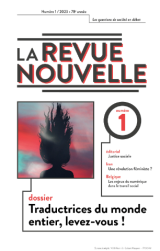George Blecher
George Blecher is a former professor at the City University of New York. He is a writer, journalist and translator. His articles appear in, among others, the New York Times, Eurozine, New Republic, Christian Science Monitor, as well as Visegrád Insight and the Danish daily Information. He is a member of the Eurozine Advisory Board.
https://www.georgeblecher.com/
Articles
President Bush’s State of the Union address reflected the current mood in the US: muted, sombre, and resigned. After four years in Iraq, Americans appear to be uniformly numb and in a shared state of confusion and despair. This new attitude is unprecedented, and suggestive of a change in the way the US may start to look at itself, writes George Blecher.
A nation like any other
Western Europe holds Israel to impossible standards
Since the conflict with Lebanon, there has been a sense among Western intellectuals that Israel has crossed some moral boundary line. But western European rhetoric holds Israel to impossible standards of perfection. Israel is behaving no better or worse than its neighbours in the Middle East, writes George Blecher.
To observers of Danish political developments, the Jyllands-Posten affair did not come out of the blue. The increasingly conservative and anti-immigrant stance taken by Fogh Rasmussen’s centre-right government and its coalition partner, the Dansk Folkeparti, along with Fogh Rasmussen’s closeness to George W. Bush, have created a political climate in which the cartoons could be published. To subsequently denounce critics of the cartoons as enemies of free expression is disingenuous, says Geoge Blecher.
A warning to Europe from across the Atlantic: are you sure you want a privatized healthcare system? Where the sick play phone tag with disembodied insurance brokers? Where over-cautious doctors insure themselves against malpractice claims? Where patients have to ask their insurers for permission to go to hospital? It’s not only the inconvenience, it’s the cost of the whole thing, says George Blecher.
In the light of the American presidential election in November 2004,
George Blecher muses on the growing gap between those sympathising with
the left and those people feeling close to the right. Blecher observes
the fears and projections of Republicans towards Democrats and vice
versa. Where does the prevalent feeling between the two
parties – namely hatred – derive from? Read George Blecher’s thoughts on the issue.
The popularity of recent war news documentaries in America shows that the public is hungry for more probing and serious information about the Iraq war, argues George Blecher, since the large television networks have failed to report and analyse the war in-depth and have instead opted for insubstantial, but flashy news clips that depict a sanitized and highly patriotic version of the war. Despite this renewed interest, Blecher is pessimistic about a sustained, serious engagement on behalf of Americans with the war.
Oasis in the desert
A conversation with Kevin Klose, President of the American National Public Radio
National Public Radio (NPR) is the closest thing in the US to a European state-run media network, although it’s neither state-run nor a media network. It was created in 1970 as a non-profit corporation to produce radio programs “in the public interest.” In this interview, Klose speaks about public radio that, with its emphasis on fact-based journalism, offers an alternative from the steady stream of sensationalist, right-wing talk-shows available on private radio.
George Blecher commemorates Lothar Baier
Lothar Baier (1942-2004)
Since I heard of Lothar Baier’s death, I’ve had the nagging wish to call Lothar in Montreal to try to make sense together of this weird, tragic event.


